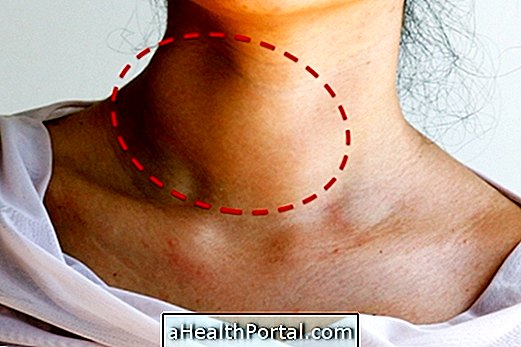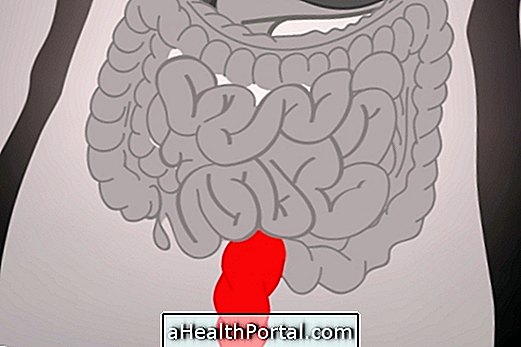A goiter is a thyroid disorder characterized by the enlargement of this gland, forming a kind of lump or lump in the neck region, which becomes more rounded and wider than normal.
Goitre usually can be easily observed without great difficulty, and can be symmetrical, asymmetrical, composed of a nodule or a set of them, in these cases known as nodular or multinodular goiter.
Goiter can have several causes, but it is common to arise when disturbances in the functioning of the thyroid appear, such as hyperthyroidism or hypothyroidism, or due to the absence of iodine, therefore it is recommended to consult an endocrinologist as soon as possible, so that the diagnosis can be made. and proper treatment was initiated.

Main symptoms
The main symptom of a goiter is an increase in thyroid volume, which is often visible. In addition, there may also be the development of other signs and symptoms, such as:
- Difficulty swallowing;
- Emergence of a lump or lump in the neck;
- Appearance of cough;
- Discomfort in the neck region;
- Feeling of shortness of breath;
- Hoarseness.
In addition, symptoms such as easy tiredness, depression, muscle or joint pain that may indicate the presence of hypothyroidism, for example, may also appear.
How the diagnosis is made
The diagnosis of the goiter must be made by the endocrinologist or general practitioner through a set of tests, which determine the characteristics of the goiter and whether it is a goiter is benign or malignant.
First, the doctor starts by observing the presence of a lump in the neck, usually asking afterwards to perform an ultrasound or ultrasound that will allow a better visualization of the thyroid gland. In addition, the diagnosis is also complemented with the performance of specific blood tests that assess the amount of thyroid hormones in the blood, such as T4, T3 and TSH, which allows to identify if there are disturbances in the functioning of the thyroid.
In cases where the doctor suspects thyroid cancer, he will recommend performing a puncture or biopsy of the thyroid, in which a small piece of this gland is removed. This test does not hurt and does not leave a scar and the small piece collected is then smoothed in the laboratory.
See more about the tests that evaluate the thyroid.
Possible causes
Goiter can develop as a result of several changes, such as:
- Disorders in the functioning of the thyroid such as hyperthyroidism or hypothyroidism;
- Use of some medications;
- Autoimmune diseases such as autoimmune thyroiditis;
- Infections;
- Thyroid tumor.
Goiter can also arise due to iodine deficiencies, which cause the thyroid gland to be forced to work harder to capture the iodine needed for the synthesis of thyroid hormones. This hard work done by this gland leads to its increase in size and thus the appearance of a goiter. In addition, there are cases where the goiter appears right at birth, in these cases known as congenital goiter.
Goiter treatment
When goiter is caused by iodine deficiencies, its treatment is done by administering iodine in doses 10 times greater than the recommended daily dose for a few weeks. With this treatment, the thyroid gland is able to effortlessly capture the iodide it needs for hormone synthesis, which after a few weeks can return it to its normal size. However, in more severe cases it may be necessary to maintain treatment for life.
In addition, when goiter occurs due to iodine deficiency, it is recommended that foods rich in this mineral be consumed, such as iodized salt, salmon, tuna, eggs and milk, for example. Check out a list of iodine-rich foods.
In cases where there are disturbances in the functioning of the thyroid such as hyperthyroidism or hypothyroidism, the treatment is not linear, and can be done using drugs such as Tapazol or Puran T4 or with radioactive iodine capsules. In cases of thyroid cancer, it may be necessary to remove this gland through surgery.
Was this information helpful?
Yes No
Your opinion is important! Write here how we can improve our text:
Any questions? Click here to be answered.
Email in which you want to receive a reply:
Check the confirmation email we sent you.
Your name:
Reason for visit:
--- Choose your reason --- DiseaseLive betterHelp another personGain knowledge
Are you a health professional?
NoMedicalPharmaceuticalsNurseNutritionistBiomedicalPhysiotherapistBeauticianOther




















